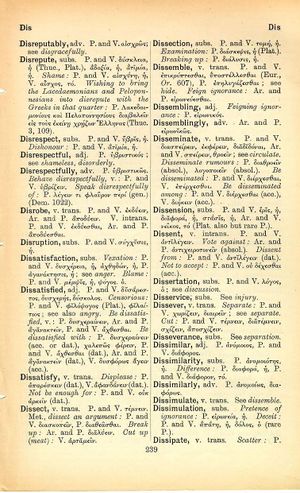dissent: Difference between revisions
From LSJ
Έγ', ὦ ταλαίπωρ', αὐτὸς ὧν χρείᾳ πάρει. Τὰ πολλὰ γάρ τοι ῥήματ' ἢ τέρψαντά τι, ἢ δυσχεράναντ', ἢ κατοικτίσαντά πως, παρέσχε φωνὴν τοῖς ἀφωνήτοις τινά –> Wretched brother, tell him what you need. A multitude of words can be pleasurable, burdensome, or they can arouse pity somehow — they give a kind of voice to the voiceless.
(Woodhouse 2) |
(CSV3) |
||
| Line 1: | Line 1: | ||
{{ | {{Woodhouse1 | ||
| | |Text=[[File:woodhouse_239.jpg|thumb|link={{filepath:woodhouse_239.jpg}}]]'''v. intrans.''' | ||
P. and V. ἀντιλέγειν. | |||
<b class="b2">Vote against</b>: Ar. and P. ἀντιχειροτονεῖν (absol.). | |||
<b class="b2">Dissent from</b>: P. and V. ἀντιλέγειν (dat.). | |||
<b class="b2">Not to accept</b>: P. and V. οὐ [[δέχομαι|δέχεσθαι]] (acc.). | |||
}} | }} | ||
Revision as of 09:27, 21 July 2017
English > Greek (Woodhouse)
v. intrans.
P. and V. ἀντιλέγειν.
Vote against: Ar. and P. ἀντιχειροτονεῖν (absol.).
Dissent from: P. and V. ἀντιλέγειν (dat.).
Not to accept: P. and V. οὐ δέχεσθαι (acc.).

